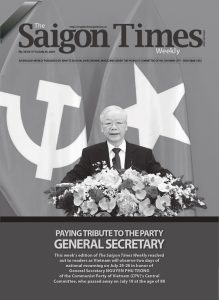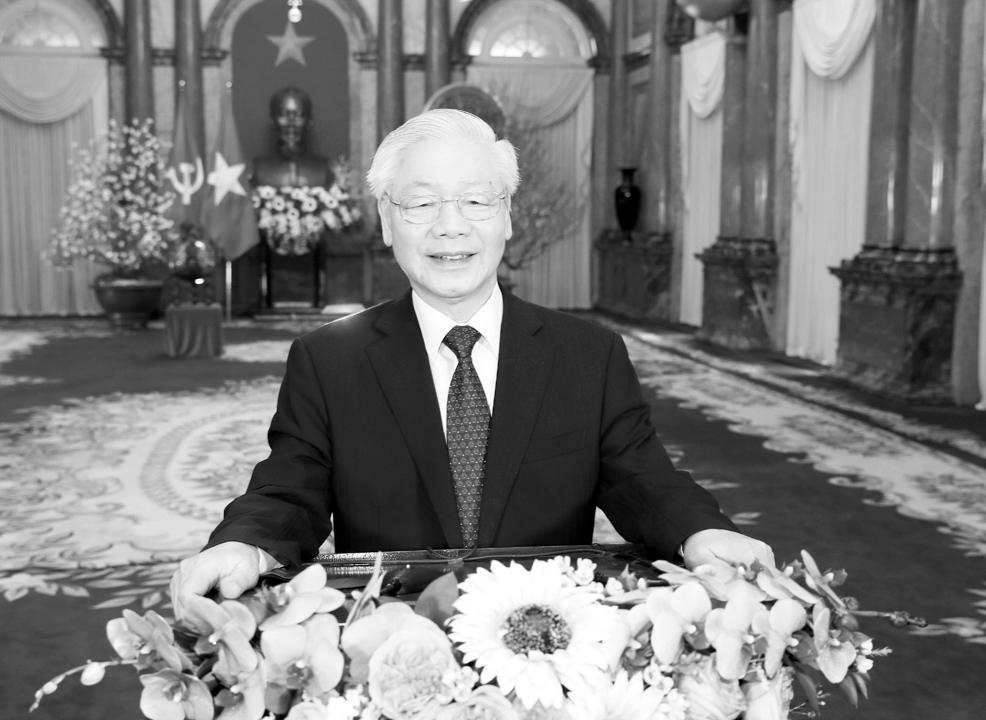This week’s edition of The Saigon Times Weekly reached out to readers as Vietnam will observe two days of national mourning on July 25-26 in honor of General Secretary Nguyen Phu Trong of the Communist Party of Vietnam (CPV)’s Central Committee, who passed away on July 19 at the age of 80.
The Party chief’s passing came after a prolonged illness despite receiving extensive care from doctors, medical professionals and his family. He left a lasting legacy in contemporary Vietnam, marked by his firm stance against corruption, deep appreciation for Vietnamese culture, and a unique approach to international relations that elevated the nation’s global standing.
A “blazing furnace” against corruption
Born in 1944 in Hanoi City, General Secretary Trong joined the CPV in 1967. He held top positions, including Secretary of the Central Military Commission, Chairman of the National Assembly, and President of Vietnam. He served as Party General Secretary for three consecutive terms, from the 11th to the 13th, and was a member of the Party Central Committee and the Politburo for multiple terms.
The fight against corruption within the Party was a hallmark of his leadership. He initiated the “blazing furnace” campaign, a key aspect of Vietnam’s corruption fight, to uphold Party rules and State laws. The Vietnam News Agency quoted Korean writer Cho Chul-hyeon as saying General Secretary Trong “interpreted the theory of the superiority of socialism in an understandable, humane way, which is a great achievement of the CPV.”
This approach not only strengthened the Party’s integrity but also fostered a sense of trust and confidence among the Vietnamese people, wrote Nguyen Trong Nghia, Politburo member, secretary of the Party Central Committee, and chairman of the committee’s Commission for Information and Education.
Between 2012 and 2022, Party committees and inspection commissions nationwide disciplined over 2,700 organizations and nearly 168,000 members, including more than 7,390 members for corruption. The PCC, Politburo, Secretariat, and Central Inspection Commission disciplined over 170 high-ranking officials under the PCC’s management, including 33 incumbent and former members, and over 50 generals in the armed forces, reported Nhan Dan newspaper.
In 2024 alone, investigations have been launched into 2,100 cases involving corruption, economic, and official misconduct. The authorities have prosecuted 4,042 defendants. Certain cases under the PCC Steering Committee’s supervision have recovered nearly VND7.5 trillion, bringing the total amount recovered since the committee’s establishment to over VND85 trillion.
General Secretary Trong’s contributions to Party building and national reform left an enduring mark on Vietnam’s political landscape and socioeconomic progress. In an article published by State media, President To Lam stated, “The essence of Comrade Nguyen Phu Trong’s thoughts revolves around the people, wholeheartedly and tirelessly serving and developing the people. The people are seen as both the subject and the focus of economic reform (known as doi moi).”
Elevating Vietnam’s culture and diplomacy
For decades, General Secretary Trong’s leadership was key in navigating the complexities of Vietnam’s cultural development in an ever-changing world, particularly during a period marked by rapid growth and increased international engagement. He recognized the need to balance preserving the country’s rich cultural heritage with embracing the opportunities presented by globalization, said Associate Professor Dr. Bui Hoai Son, a member of the National Assembly’s Culture and Education Committee.
Dr. Bui Hoai Son added that General Secretary Trong contributed to fostering a vibrant cultural landscape by supporting cultural exchange and integration and encouraging dialogue and collaboration between Vietnamese artists and intellectuals. The Party chief believed that solid cultural values were fundamental for social harmony, national unity, and Vietnam’s standing on the global stage.
Beyond cultural influence, Vietnam’s international standing has improved due to the strategic implementation of “Bamboo Diplomacy.” First introduced at the National Foreign Affairs Conference in 2021, this term embodies Vietnam’s distinctive and resilient approach to international relations.
Associate Professor Duong Van Quang, former director of the Diplomatic Academy of Vietnam, said that the deep roots of the bamboo symbolize Vietnam’s longstanding commitment to peace and harmonious relations, a tradition of the nation’s history. The bamboo’s strong trunk represents the unwavering pursuit of national interests while staying firmly rooted in these core values. The flexible leaves, he noted, embody the adaptability that is essential for effective diplomacy in the face of complex geopolitical landscapes.
Vietnamese diplomacy has flourished in recent years, marked by pivotal events like General Secretary Trong’s historic visit to Washington in 2015, the first by a CPV General Secretary, opening a new chapter in Vietnam-U.S. relations. Similarly, his visit to China in 2022 as the first foreign leader shortly after the 20th National Congress of the Communist Party of China further solidified ties between the two countries.
In 2023, U.S. President Biden’s visit to Vietnam at the invitation of General Secretary Trong, was another key moment with the upgrade of bilateral relations to a Comprehensive Strategic Partnership. In June, General Secretary Trong met with Russian President Vladimir Putin during the latter’s fifth visit to Vietnam, solidifying the Vietnam-Russia comprehensive strategic partnership in the spirit of friendship and mutual support.
Even amidst geopolitical uncertainties, Vietnam remains consistent with its “four nos” defense policy: no to joining military alliances, no to taking sides with one country to act against another, no to foreign military bases in Vietnamese territory, and no to using Vietnam as leverage to counteract other countries. This policy also includes no using force or threatening to use force in international relations.
Vietnam currently has diplomatic relations with 191 of 193 United Nations (UN) member states. Among these, Vietnam has established Comprehensive Strategic Partnerships, Strategic Partnerships, and Comprehensive Partnerships with 30 countries worldwide, including all permanent members of the UN Security Council, as per the Vietnamese Government Portal.
Leaders from across the globe, including heads of state, government officials, parliamentary representatives, and leaders of international organizations, have offered their condolences to Vietnam upon learning of the passing of General Secretary Trong. Chinese President Xi Jinping told Pham Sao Mai, Vietnamese ambassador to China, that Trong was a great leader of the Vietnamese Party and people. In a separate message, U.S. President Joe Biden said General Secretary Trong “was a champion of the deep ties between the American and Vietnamese people whose leadership helped nurture the friendship and partnership our countries enjoy today.”
In recognition of his contributions, General Secretary Nguyen Phu Trong was awarded the Gold Star Order, the 55-Year Party Membership Badge, and many other prestigious medals from both Vietnam and international organizations.

During this time, solidarity is crucial. Vietnam’s economic performance has been marked by an encouraging recovery, yet challenges remain. In an article in February, General Secretary Trong pointed out obstacles such as complex market developments, inflationary pressures, and declining production continue to pose risks to the country’s development.
The Party, Government, and business community have demonstrated a firm commitment to addressing these challenges. Vietnam has implemented various measures to stimulate economic growth, including investing in infrastructure, promoting foreign direct investment, and supporting small and medium-sized enterprises. The business community has also played an active role in driving innovation and creating jobs.
In honoring the legacy of General Secretary Trong, Vietnam can draw inspiration from his dedication, taking concerted actions to continue on the path towards development and prosperity for all.









